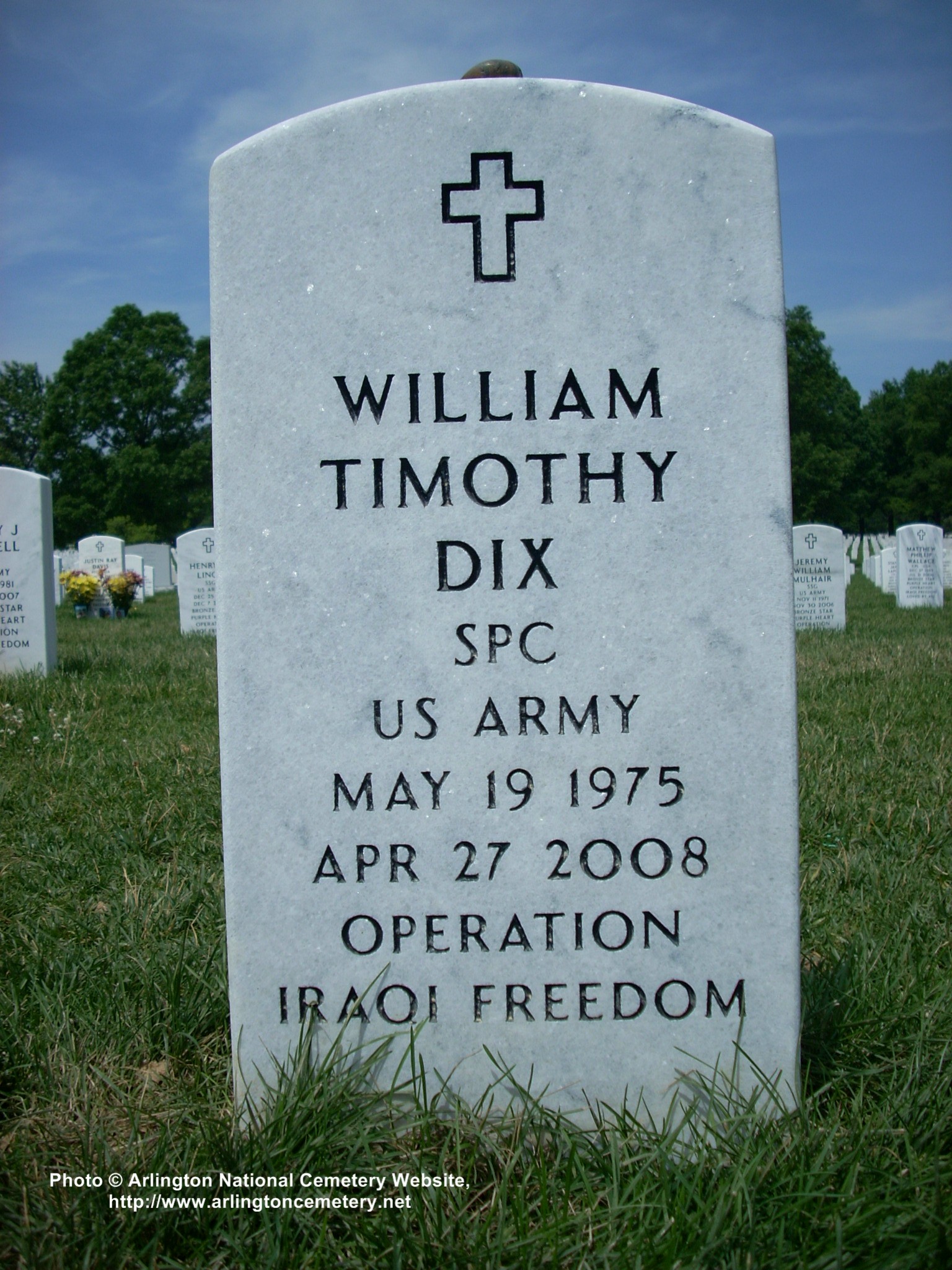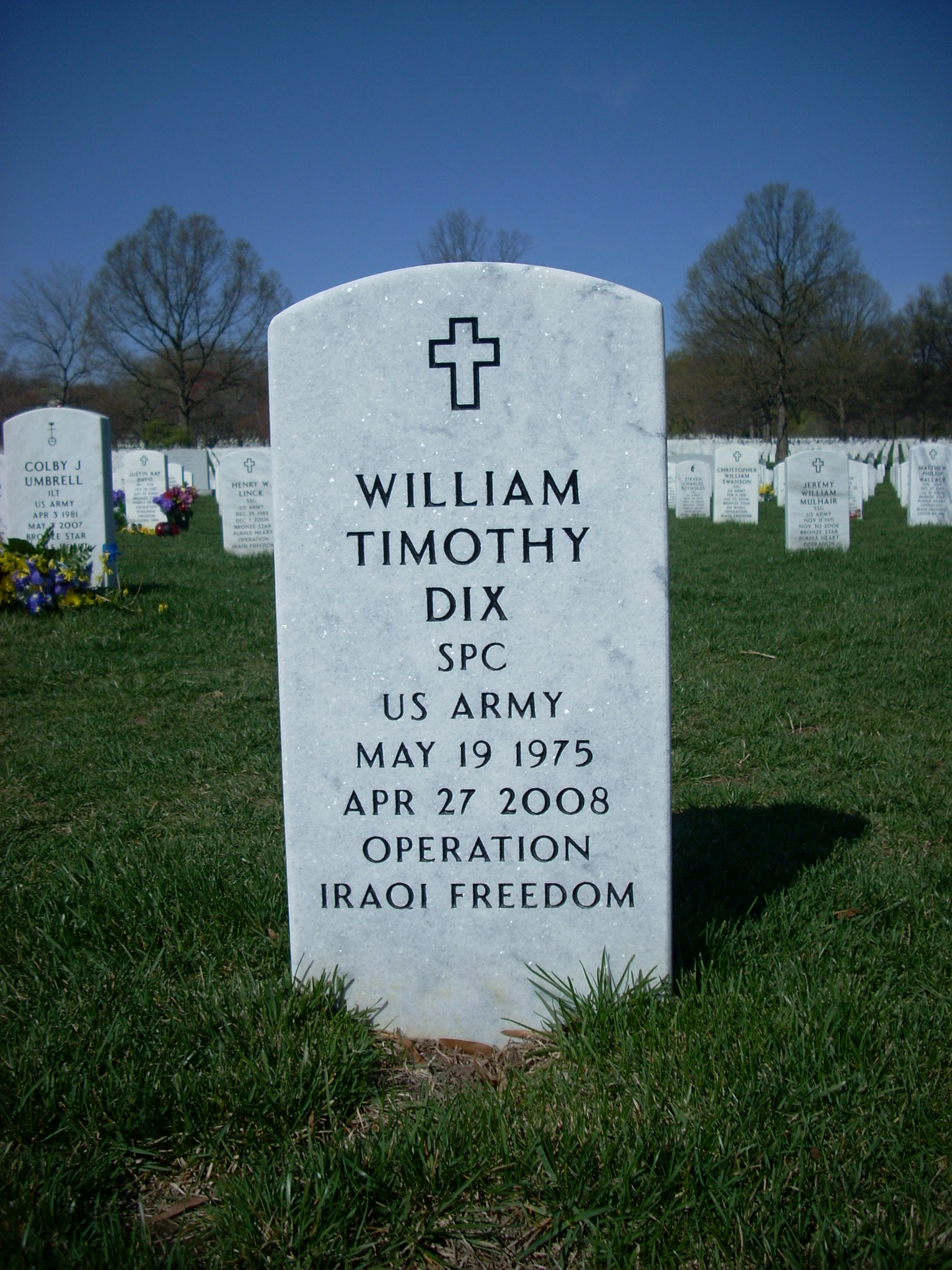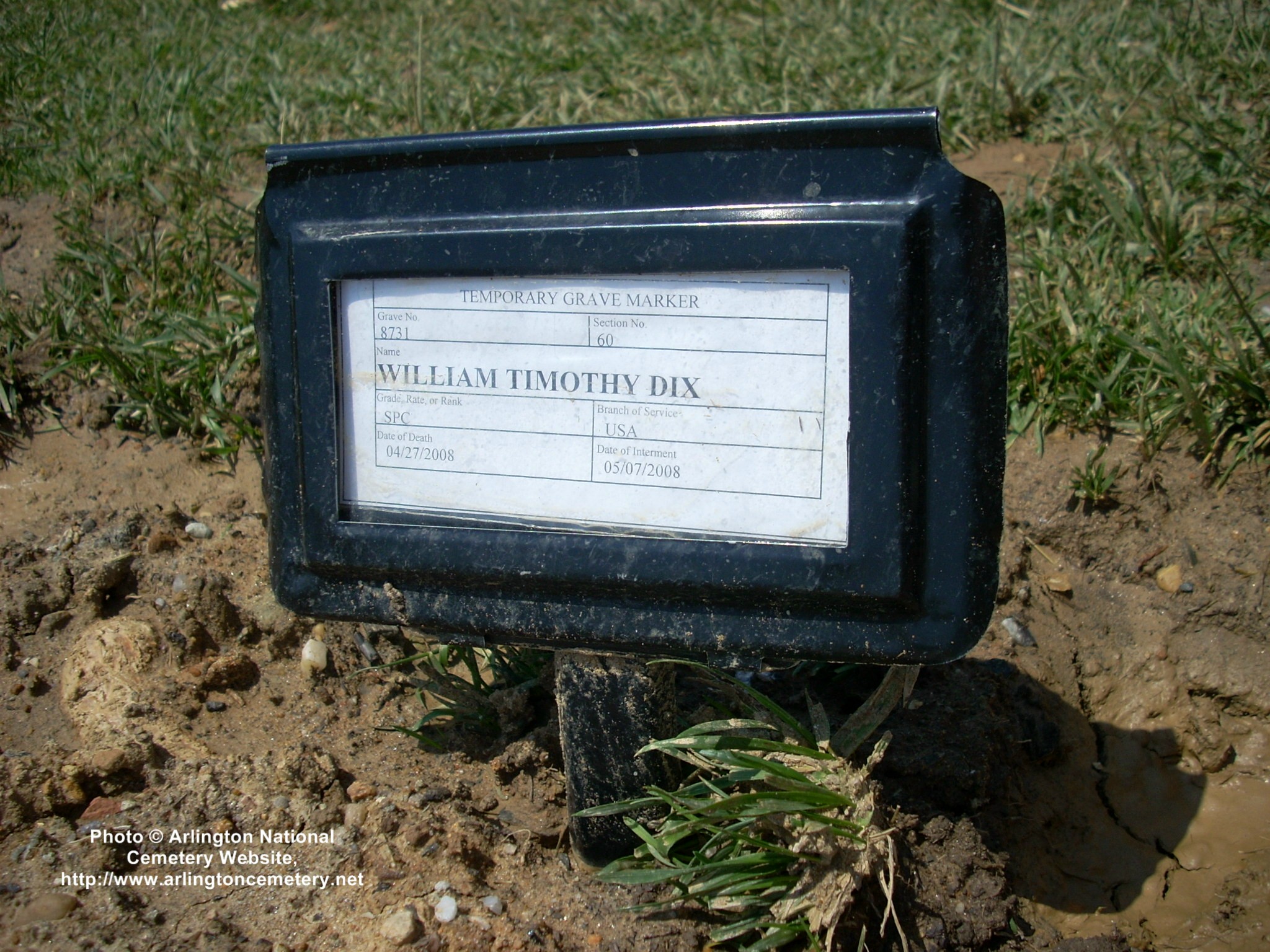U.S. Department of Defense
Office of the Assistant Secretary of Defense (Public Affairs)
News Release
IMMEDIATE RELEASE No. 364-08
April 30, 2008
DoD Identifies Army Casualty
The Department of Defense announced today the death of a soldier who was supporting Operation Iraqi Freedom.
Specialist William T. Dix, 32, of Culver City, California, died April 27 at Camp Buehring, Kuwait, of injuries suffered in a non-combat related incident. He was assigned to the 14th Engineer Battalion, 555th Engineer Brigade, I Corps, Fort Lewis, Washington.
The incident is under investigation.
Tacoma, Washington
May 15, 2008
A memorial ceremony Wednesday for another fallen soldier at Fort Lewis was like all the others that the Army post has held over these past six years of war, except in one respect.
The memorial for Specialist William T. Dix is believed to be the first in which commanders and the chaplain publicly acknowledged that the soldier’s death came at his own hand.
“Why he did it, we do not know,” his battalion commander, Lieutenant Colonel Pete Helmlinger, said in remarks that were read Wednesday at the post’s North Fort Chapel.
“Beneath his quiet and well-intentioned demeanor, he was fighting an inner battle, about what we will never know,” Helmlinger said.
“Sadly, for all, he struggled in silence, and we could not help him with his battle with his emotions,” he said.
Helmlinger is in Iraq leading the 14th Engineer Battalion on its third deployment of the war. His remarks, made at the unit’s ceremony last week in Iraq, were read Wednesday at Fort Lewis by his battalion’s rear detachment commander, Captain Corey Warren.
Dix, a 32-year-old Virginian who served a stint in the Marine Corps before switching to the Army, died April 27, 2008, at Camp Buehring. The Department of Defense said his death was the result “of injuries sustained in a noncombat-related incident.”
The Army has not announced the findings of an investigation into the circumstances. Warren and a Fort Lewis spokeswoman said they couldn’t comment further about the investigation.
Soldiers who spoke at Wednesday’s memorial remembered Dix as “upbeat and positive.”
“I would ask him about his day, and his reply – ‘another great day to be in the Army’ – never changed. I never knew him to utter a single complaint,” said Sergeant Michael Burnett.
He said they went on missions together during the 14th Engineers’ last Iraq deployment, in 2005-06. The battalion’s main mission was to scour Iraqi roads for insurgent bombs.
Before Dix came to Fort Lewis in 2005 he served a year in Korea. His latest assignment was as the driver for the battalion’s command sergeant major.
“When Dix got the urge to speak, we all listened, mostly because we never knew what he was going to say,” Burnett said.
Dix was the funniest guy in their platoon and kept things light, he said.
One day, after passing a promotion board, Dix walked back to his tent singing “The Army Song” at full throat.
“Dix was a kind human, a gentle human being, who readily sacrificed for the Army and its mission,” Burnett said. “… He was and always will be my friend, and I will miss him greatly.”
The Army has seen a rising number of suicides since the onset of the Iraq war, and the 121 known cases among active-duty, National Guard and Army reserve soldiers last year was the most since the service began tracking them in 1980. Last year also saw a record number of known suicide attempts, according to a Pentagon report.
The growing number of cases has come despite extensive suicide prevention programs across the Army and recent increased attention to the problem inside and outside the service.
At least three of the 197 Fort Lewis-based soldiers to die in Iraq, Afghanistan and elsewhere in the global war on terror are known to have been suicides, although they are not publicly identified as such by the Defense Department.
The Army conducts memorial ceremonies for several purposes. They’re a place for the soldiers and their community of family members and friends to grieve. And commanders and chaplains usually try to offer some inspiration and example from the lives of the fallen. Wednesday’s ceremony was no different. About 100 soldiers attended, along with senior officers and retirees. They all stood for the arrival of Dix’ brother, Christopher.
The soldier is also survived by his mother, Barbara, of Boydton, Virginia; his father, William, of Florida; and his sister, Stephanie, of Virginia Beach, Virginia.
He was buried last week at Arlington National Cemetery.
The chaplain, Captain Scott Squires, told the gathering that “the circumstances surrounding Specialist Dix’s death are tragic and not easily understood. … Somewhere deep inside, Specialist Dix was fighting an inner battle, one that no one could see. We will never know what caused Specialist Dix to end his life.”
He encouraged soldiers to look to their religious faith and to believe that “comfort, hope and peace can be realized even in the midst of turmoil and hopelessness.”
Warren, reading Helmlinger’s remarks, called Dix “a professional, dutiful soldier. He will be sorely missed.”
Helmlinger urged soldiers not to keep their problems inside, and to find “a renewed conviction that life is worth living, and that we are all needed, by our Army and by our family and our friends.”
NOTE: William T. Dix was buried at Arlington National Cemetery on 7 May 2008.
DIX, WILLIAM TIMOTHY
- SPC US ARMY
- DATE OF BIRTH: 05/19/1975
- DATE OF DEATH: 04/27/2008
- BURIED AT: SECTION 60 SITE 8731
ARLINGTON NATIONAL CEMETERY

Michael Robert Patterson was born in Arlington and is the son of a former officer of the US Army. So it was no wonder that sooner or later his interests drew him to American history and especially to American military history. Many of his articles can be found on renowned portals like the New York Times, Washingtonpost or Wikipedia.
Reviewed by: Michael Howard


